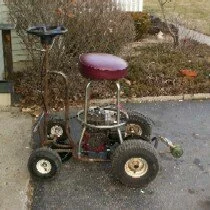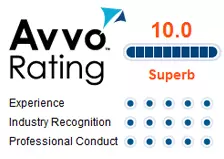This might seem a bit like “sensational” reporting, but it appears to be true. It was reported by Ohio News Talk station WTVN The 28 year old defendant made the contraption out of a riding lawn mower. He then allegedly drove it while drunk. He attracted police attention when he attempted a U turn and crashed. Apparently no one was hurt. The reason the story appears a bit shocking is because it just doesn’t seem like the drunk driving laws were really designed to make criminals out of people driving their lawn mowers drunk. However, in most states this is in fact considered criminal behavior, including of course, the state of Ohio.
The pivotal question in the bar stool case is whether or not a lawn mower fits the legal definition of “motor vehicle.” In my book Defending Drinking Drivers I discuss this issue in section 121.2 as follows:
§121.2 A Motor Vehicle
The state may be able to establish that the defendant was driving, but can the state prove that the defendant was driving a motor vehicle? In most cases, where the defendant is driving an automobile, a truck or a motorcycle, there will be no problem for the state. What happens, however, if the defendant is driving a moped, a motorized bicycle, a snowmobile or even riding a horse? Some states have, either by design or otherwise, included these examples in the definition of a “vehicle.” See Essen, “A Vehicle by any Other Name: A Constitutional Attack Upon DWI Statutes,” 3 DWI Journal: Law & Science 11 (November 1988) where the author argues that the definition of the word “vehicle” in many DWI statutes is so overbroad that it renders the law unconstitutional and that the definition of vehicle can include anything from horses to baby buggies to snowmobiles. See also People v. Jordan, 142 Cal.Rptr. 401 (1977); State v. Senko, 457 A.2d 824 (Me. 1983); State v. Lyons, 378 A.2d 83 (N.J. Super. Ct. 1977); Small v. State, 631 S.W.2d 201 (Tex. App. Corpus Christi 1982) (all including motorized bicycles, mopeds or motorcycles within definition of motor vehicle); but see State v. Woodruff, 726 P.2d 396 (Ore. App. 1986) (bicycle rider is not “driver of a motor vehicle”); State v. Johnson, 497 A.2d 242 (N.J. Super. Ct. 1985) (bicycle rider not an operator of motor vehicle under DWI statute); Commonwealth v. Griswold, 459 N.E.2d 142 (Mass.App. 1984) (even though statute excluded mopeds from definition of motor vehicle, this did not preclude a prosecution of a moped rider for DUI); State v. Guidry, 467 So.2d 156 (La.App. 1985) (bicycle rider could not be prosecuted for DWI); State v. Howard, 510 So.2d 612 (Fla.App. 1987) (bicycle is a vehicle and rider is subject to DWI prosecution); State v. Shepard, 439 N.E.2d 920 (Ohio App. 1981) (a bicycle is a vehicle under the DWI statute); State v. Powell, 306 S.W.2d 531 (Mo. 1957) (farm tractor is a vehicle under the DWI laws); Conrad v. Dillinger, 270 P.2d 216 (Kan. 1954) (a horse and saddle is a vehicle for purpose of the laws regulating highway traffic); State v. Blowers, 717 P.2d 1321 (Utah 1986) (horse rider is not an operator of a vehicle for purposes of the DWI statute); State v. Dellinger, 327 S.E.2d 609 (N.C.App. 1985) (a horse is a vehicle under the DWI statute and the rider can be subject to a drunk driving prosecution).
The problem with broad definitions of vehicle in DWI statutes is that they may become so all inclusive that their constitutionality can be attacked on the grounds of overbreadth, arbitrariness, or capriciousness in application. In these respects, they may violate due process. See, Essen, “A Vehicle by any Other Name: A Constitutional Attack Upon DWI Statutes,” 3 DWI Journal: Law & Science 11 at 4 (November 1988). As a result, Essen suggests the following:
While defendants in the past may have argued that the definition of a vehicle was vague, and was never intended to be so broad as to include a horse or bicycle, defense attorneys may be far more successful in arguing that the definition of a vehicle in a particular statute is not vague, but rather, that in its plain meaning and on its face, the statute is so broad as to include practically any device imaginable in or upon which goods or persons may be conveyed. Id. at 4 (emphasis in original).
In my opinion, had this alleged drunk driving offense occurred in Michigan, the driver would have been charged. Whether or not a jury would conviction of course is a totally different matter.

Is this a "motor vehicle"
Related posts:



